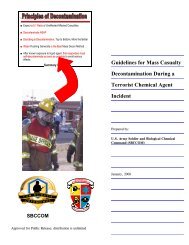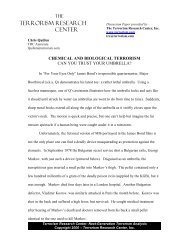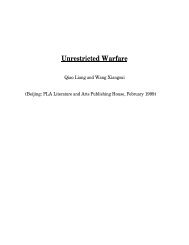Combating Proliferation of Weapons of Mass Destruction
Combating Proliferation of Weapons of Mass Destruction
Combating Proliferation of Weapons of Mass Destruction
Create successful ePaper yourself
Turn your PDF publications into a flip-book with our unique Google optimized e-Paper software.
Missile Defense programs, and that portion <strong>of</strong> the Cooperative Threat Reduction programinvolving destruction <strong>of</strong> ballistic missiles. The Counselor shares with the Senior Directorfor Non-<strong>Proliferation</strong> and Export Controls responsibility for policy relating to nuclearweapons free zones and the Conference on Disarmament.The Counselor is also responsible for assembling the President’s annual report on U.S.National Security Strategy, required by an amendment to the National Security Act. Thisreport is the primary <strong>of</strong>ficial statement <strong>of</strong> U.S. national security strategy and contains asignificant section on proliferation. Typically, the proliferation section is drafted in theDepartment <strong>of</strong> State, edited by the Senior Director for Non-<strong>Proliferation</strong> and ExportControls, and coordinated widely throughout the executive branch.Regional Senior Directors. As noted above, three regional Senior Directors—Russia,Ukraine, and Eurasia; the Near East and South Asia; and Asia—have major proliferationand export control issues in their portfolios. Physical proximity <strong>of</strong> <strong>of</strong>fices in the OldExecutive Office Building, secure telephone and e-mail connections, and frequentparticipation in meetings on issues <strong>of</strong> common concern facilitate cooperation with theSenior Director for Non-<strong>Proliferation</strong> and Export Controls and with other interested NSCstaff members.The Senior Director for Russia, Ukraine, and Eurasia has, since the outset <strong>of</strong> the ClintonAdministration, had a very close relationship with the Senior Director for Non-<strong>Proliferation</strong>and Export Controls. Indeed, negotiations concerning proliferation issues and exportcontrols have been central to the U.S.-Russian relationship. The two senior directors andtheir staffs are in constant contact on these issues and cooperate extensively. Together,they also work closely with the Vice President’s national security affairs staff to ensure thatthe Vice President is well-prepared for meetings and conversations with Russian leaders.<strong>Proliferation</strong> concerns in Iran, Iraq, India, and Pakistan also require close coordinationbetween the Senior Director for Near East and South Asia and the proliferation directorate.After the Indian and Pakistani nuclear tests, for example, the Senior Director for Non-<strong>Proliferation</strong> and Export Controls took the lead on sanctions implementation and exportcontrol issues, while the regional Senior Director worked with the Deputy Secretary <strong>of</strong>State on diplomatic responses.<strong>Proliferation</strong> issues have been an important element <strong>of</strong> U.S.-China relations and at thecenter <strong>of</strong> U.S.-North Korea relations, requiring that the Senior Director for Asia workclosely with the Senior Director for Non-<strong>Proliferation</strong> and Export Controls. He estimatesthat they are in contact with each other at least three or four times each day. The Asia staffhas a military <strong>of</strong>ficer on reimbursable detail who focuses closely on North Korea and, infact, has been a member <strong>of</strong> the State Department-led team negotiating with the NorthKoreans. The Senior Director, a well-known expert on China, oversees Chinese issues.6







